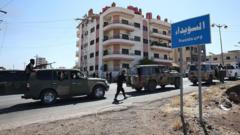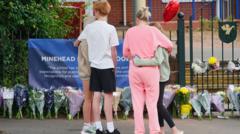Will a New Syrian Force End the Clashes in the South?

Understanding the Current Situation in Syria: A Deep Dive into Sectarian Clashes
The ongoing conflict in Syria continues to evolve, marked by a series of sectarian clashes, particularly in the southern region around Suweida. With the recent deployment of a new military force aimed at quelling violence between Bedouin and Druze fighters, the situation remains dire as almost 600 lives have already been lost since the unrest began. This article seeks to unravel the complex dynamics at play in this conflict, the historical context behind sectarian divisions, and the implications of international involvement in these clashes.
The Background of Sectarian Tensions in Syria
Sectarian violence in Syria is not a new phenomenon. The country has a rich tapestry of ethnic and religious groups, including Sunni Arabs, Alawites, Christians, Druze, and Kurds. The Druze community, which follows a unique faith derived from Shia Islam, has historically been marginalized in a predominantly Sunni Arab nation. This marginalization has led to deep-rooted suspicions and tensions, particularly in times of political instability.
The Syrian civil war, which erupted in 2011, exacerbated these tensions as different groups vied for power and influence. The government, led by President Bashar al-Assad, has been accused of favoring certain sects over others, further entrenching divisions. The rise of jihadist groups has also intensified hostilities, as they often target minority communities, including the Druze.
The Recent Clashes in Suweida
In recent days, the city of Suweida has become a hotspot for violence. Reports indicate that nearly 600 individuals have been killed in the clashes, which started over disputes between Bedouin and Druze factions. The Syrian interim President, Ahmed al-Sharaa, has called for restraint among all parties involved, highlighting the urgent need for dialogue to prevent further bloodshed.
Eyewitness accounts reveal that government troops deployed to the region have been accused of committing atrocities, including extrajudicial executions of Druze civilians. These allegations have led to widespread outrage and distrust among the local population, further complicating the already volatile situation.
The Role of International Players
The international community has been closely monitoring the situation, with Israel playing a particularly noteworthy role. Reports suggest that Israel conducted airstrikes in Syria to compel government troops to withdraw from Suweida province. In a recent statement, the U.S. ambassador to Turkey, Tom Barrack, indicated that a ceasefire agreement had been reached between Israeli Prime Minister Benjamin Netanyahu and President Sharaa, a claim that remains unconfirmed by the parties involved.
This involvement of external actors raises questions about the sovereignty of Syria and the long-term implications for its people. The complexities of geopolitical interests in the region could hinder a peaceful resolution and exacerbate sectarian divides.
The Druze Community: A Closer Look
The Druze community in Syria, predominantly located in Suweida, follows a secretive faith that combines elements of Islam, Gnosticism, and other philosophies. Their religious beliefs make them a minority in Syria and neighboring countries like Lebanon and Israel. This minority status has often led to discrimination and violence against the Druze, particularly in the context of a civil war that has seen various factions vying for control.
As the situation escalates, the Druze community finds itself at a crossroads. Many leaders within the community have called for unity among different sects to foster a new Syrian identity that embraces diversity rather than division. However, achieving this goal requires overcoming deep-seated mistrust and fear, particularly in light of recent violence.
Human Rights Violations and Accountability
The United Nations has expressed growing concern over human rights violations occurring in Suweida. UN human rights chief Volker Türk highlighted credible reports of summary executions and arbitrary killings, implicating both security forces and various armed groups. The urgency of addressing these violations cannot be overstated, as a lack of accountability could lead to further bloodshed and instability in the region.
In a televised address, President Sharaa vowed to hold accountable those responsible for the violence against the Druze community, emphasizing the government’s responsibility to protect all citizens. However, skepticism remains high among the population, who have witnessed numerous instances of impunity and corruption within the government.
The Path Forward: Building a Unified Syrian Identity
The call for a unified Syrian identity is a recurring theme in discussions surrounding the conflict. The idea is that all ethnic and religious groups must come together to forge a new future for Syria, one that prioritizes peace and mutual respect. This ambition faces significant obstacles, including entrenched sectarian divisions and a history of mistrust among various factions.
To achieve this vision, grassroots initiatives promoting dialogue and understanding between different communities are essential. Programs that encourage cooperation and shared goals could help break down barriers and foster a sense of belonging among all Syrians, regardless of their background.
Frequently Asked Questions
What are the main causes of sectarian clashes in Syria?
The primary causes of sectarian clashes in Syria include historical grievances, political marginalization, and the ongoing civil war, which has exacerbated divisions among different ethnic and religious groups.
What is the role of the Druze community in the Syrian conflict?
The Druze community plays a unique role in the Syrian conflict, often finding themselves caught between competing factions. Their distinct religious beliefs and minority status have made them targets of violence, while also positioning them as potential advocates for unity among diverse groups.
How is the international community responding to the violence in Suweida?
The international community has expressed concern over the violence in Suweida, with calls for restraint and accountability. Countries such as Israel and the United States have taken steps to intervene, but the long-term impact of these actions remains uncertain.
What steps can be taken to promote peace and unity in Syria?
Promoting peace and unity in Syria requires a multifaceted approach, including grassroots initiatives that foster dialogue, international support for inclusive governance, and accountability measures for human rights violations.
Conclusion: The Road Ahead for Syria
The path forward for Syria is fraught with challenges, yet the desire for peace and unity among its diverse communities remains strong. As the situation continues to unfold, it is crucial for all parties to engage in meaningful dialogue and prioritize the protection of human rights. Only through cooperation and understanding can Syria hope to overcome its sectarian divisions and build a brighter future for all its citizens.
As we reflect on the current turmoil, one must ponder: Can Syria emerge from the shadows of violence to embrace a future of unity and peace? #Syria #Druze #SectarianConflict
```Published: 2025-07-19 02:00:08 | Category: world



